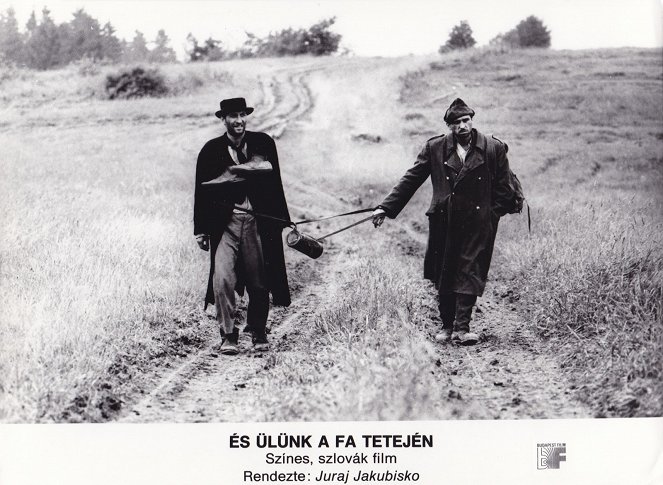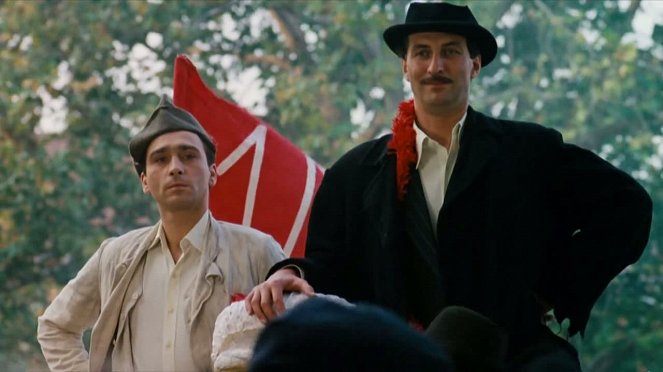Regie:
Juraj JakubiskoKamera:
Laco KrausMusik:
Jiří BulisBesetzung:
Ondřej Pavelka, Bolek Polívka, Markéta Hrubešová, Deana Horváthová-Jakubisková, Viliam Polónyi, Miroslav Macháček, Štefan Kvietik, Stanislav Štepka (mehr)Inhalte(1)
The story of two a-lot-different-natured friends, the comedian Pepe and a front soldier Prengel, takes place right after the end of WW II. Finding a treasure of Jewish gold turns them into an inseparable couple, later joined by Ester, a Jewish girl returning from a concentration camp. Thus, brought together by chance, each of the three homeless people in their very own ways tries to fulfill their dreams of happiness. (Verleiher-Text)
(mehr)Videos (1)
Kritiken (2)
Ich verstehe gar nicht, warum ich so lange gebraucht habe, um festzustellen, wie gut doch dieser Film ist. Nichtsdestotrotz, es ist passiert und nach etlichen Versuchen hat Jakubiskos Geschichte perfekt funktioniert. Wenn ich mir einmal die sonderliche Gekünsteltheit des Soundtracks (anscheinend verursacht durch das Post-Synchronisieren) und Markéta Hrubešová wegdenke, für die höchstens einmal ihr typisch slawische wellige Körperform schauspielert, so ist Sitting on a Branch, enjoying Myself eine brillante und kompositorisch fein abgestimmte Botschaft über mehrere Schicksale auf der Leinwand einer stürmischen Zeit. Jakubisko ist dazu in der Lage, ohne unnötigen Prunk die schrecklichen Paradoxe des Stalinismus mit einer bloßen Andeutung darzustellen, jedoch auch das Schicksal der Helden mit all der Höflichkeit und der Tragik des Alltags darzustellen. Der Film erinnert an Nikita Michalkovs Die Sonne, die uns täuscht, wo die ruhige persönliche Ebene gleichfalls scharf mit der turbulenten Maschinerie der Zeit kontrastiert. Jakubisko hat einen bewegten, glaubwürdigen und im besten Sinne des Wortes tragischen Film gedreht.
()
Originally, I had a completely different review of this film, brimming with excitement and terms such as magical realism and the Slovak Fellini. But as time goes by, one reevaluates their opinions, perhaps because they've seen more and also because, with increasing years, a more critical spirit manifests itself in me. Juraj Jakubisko is a director whose reviews are consistently getting worse, to the point where, from my perspective, I consider him the director of only two films made in the early and late 80s. These films are The Millennial Bee, which I still highly value, and the second is this film. However, I have to lower my rating by two stars, even though it's more like 3 and a half stars. Due to the high rating it has on FilmBooster, I simply rounded it down. Jakubisko is primarily hampered by the choice of actors because unfortunately, Markéta Hrubešová does not even provide average acting, and here she functions more as a typecast actress, simply a charming redhead with the necessary curves. Bolek Polívka belongs to the same category of comedians as, let's say, Vlasta Burian and such a force is difficult to control, as it is difficult to work with him, and he tends to create figures and caricatures where multifaceted acting is needed. I also don't understand why Jakubisko has a high number of Czech actors in his cast, because the Slovak scene could have offered him plenty of great characters. It is also disappointing that there are a number of minor flaws, such as shots of ripe fields of wheat when, according to the timeline, it was supposed to be spring, or when the character of Deana Horváthová enthusiastically talks about preparing for monetary reform, which could be compared to treason because it was one of the most guarded state secrets, and so on. Jakubisko's usual tricks, such as the flying angel over the settlement, no longer work on me. The character of the young Stalinist is caricatured to such an extent that it loses its repellent aspect. On the other hand, despite all the reservations mentioned, in this film, Jakubisko's poetics still work very well, and I will definitely return to his protagonists in the future. Overall impression: 65%.
()
Galerie (21)
Photo © Budapest Film



Werbung